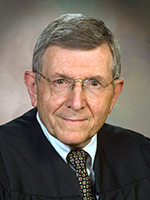Profile in Professionalism
Judge Alan D. Lourie
2020 Professionalism Award for the Federal Circuit
By Rebecca A. Clay
 Alan D. Lourie came to law via a roundabout route: chemistry.
Alan D. Lourie came to law via a roundabout route: chemistry.
His early ambition “certainly was not to become a lawyer, much less a judge,” says Lourie, who celebrates 30 years as a judge on the U.S. Court of Appeals for the Federal Circuit this year. “I was interested in chemistry.”
After earning an undergraduate degree from Harvard University in 1956, he earned a master’s degree in organic chemistry from the University of Wisconsin in 1958 and a doctorate in chemistry from the University of Pennsylvania in 1965. As part of his doctoral work, he invented a new compound and earned the first of his two patents. “I made a lot of new compounds,” he says. “They had a modest amount of activity in animals—enough to justify issuance of patents—but not enough activity to be of medical or commercial interest.”
That work did result in a fascination with patent law. After working as a chemist for Monsanto, Lourie worked as a chemist, scientist, and patent agent at Wyeth Labs. “I started doing patent searches for the patent attorney at the company,” Lourie remembers. As a patent agent, Lourie represented the company as it applied for patents. “That person does not have to be a lawyer if he passes an exam on patent law and has scientific qualifications,” Lourie says. “But I wanted the full qualification.” To achieve that goal, he went to law school at night and earned his law degree from Temple University in 1970.
Lourie combined his twin passions of chemistry and the law by joining SmithKline Beecham Corporation. As vice president for corporate patents and trademarks and as associate general counsel, Lourie worked with scientists researching and developing new drugs, then helped shepherd those drugs through the patent process. “The job basically was to protect the inventions the company made,” says Lourie, who spent 26 years at the company.
Meanwhile, the United States had created the federal circuit. “Its main emphasis was to provide uniform patent law around the country,” he says. “There was a concern that other countries were getting ahead of us in terms of innovation and that uncertain patent law might have played a role in not providing sufficient incentives for investment in new inventions.” President George H.W. Bush appointed Lourie as judge in the court in 1990.
“We are a semi-specialty court,” Lourie says. Unlike the 12 other circuits, which have a general focus but regional jurisdiction, the federal circuit is national in jurisdiction but has a more narrow focus, handling patent cases from the district courts and the U.S. Patent and Trademark Office and trade cases from the U.S. Court of International Trade, among other cases. “Judge Lourie has authored some of the most important opinions of the court,” says Judge Richard Linn, Lourie’s colleague on the federal circuit, who was among those who nominated Lourie for the Professionalism Award.
Having a background in both chemistry and patent law has helped Lourie write clear decisions. He recommends that all would-be lawyers develop expertise in science, engineering, or some other field in addition to the law. “It is good to combine backgrounds,” he says. “Career-wise, it makes you attractive to employers, and it provides for a diversity of activity and interests.”
Lourie has long been active in the intellectual property community outside the courtroom as well. He was one of the initial members of the Giles S. Rich American Inn of Court in Washington, D.C., the first American Inn of Court to focus exclusively on intellectual property law. “Judge Giles Rich, with whom I served for nine years, is known as the modern father of patent law,” says Lourie, now an honorary member of the Inn.
Before his appointment as judge, Lourie served as president of the Philadelphia Patent Law Association and served on the boards of directors of both the American Intellectual Property Law Association and the Intellectual Property Owners Association. Since joining the court, he has also received awards from such organizations as the American Intellectual Property Law Association, Intellectual Property Owners Association, Boston Patent Law Association, Philadelphia Intellectual Property Law Association, New York Intellectual Property Law Association, and New Jersey Intellectual Property Law Association.
Although Lourie enjoys reading, playing golf, going to concerts and the opera, and spending time with his grandchildren and great-grandchildren, he has no plans to retire. “I enjoy my work and working with my colleagues and law clerks,” says Lourie, now 85. “I am healthy, and I hope to continue for the indefinite future.”